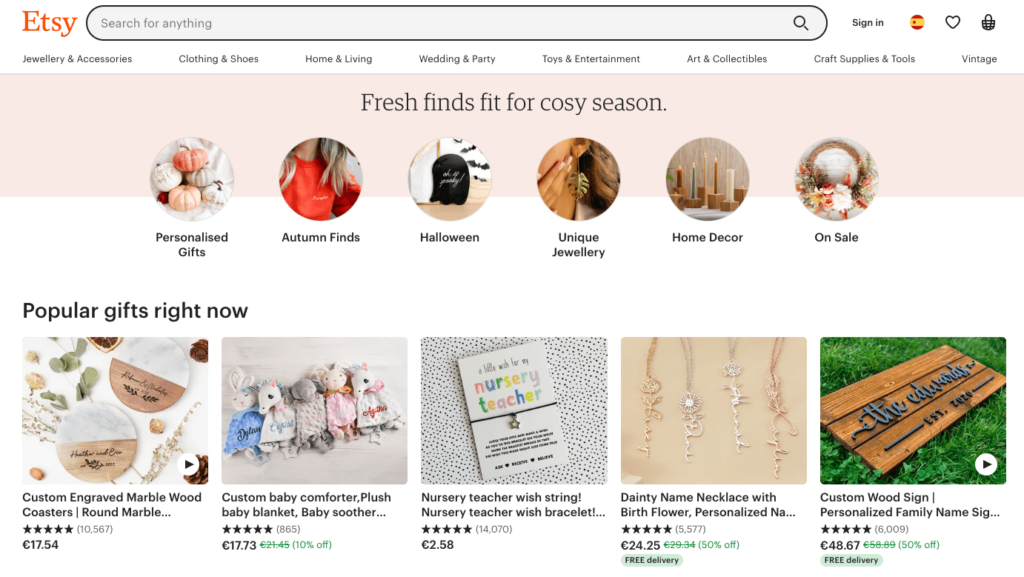Today we are going to learn and understand about: What is Etsy, What is Shopify, What is the downside of Etsy, What is the downside of Shopify, Etsy vs Shopify comparison.
Etsy and Shopify both has millions of online stores and user base. The unique difference between them is Etsy allows to create a brand on the platform and sell products, Shopify – allows you to create your own store; which means you can build a standalone website as an independent store (popularity and marketing is the key here).
In today’s digital age, starting an online business has become more accessible than ever before. Two popular platforms that entrepreneurs often consider for their e-commerce ventures are Etsy and Shopify. Both have their unique strengths and weaknesses, making the choice between them a critical decision. In this blog post, we will explore the key differences between Etsy and Shopify, helping you make an informed decision about which platform is the right fit for your e-commerce business.
Understanding Etsy

Here are some key points to consider when evaluating Etsy as a platform for your e-commerce business:
Niche Market: Etsy indeed provides a niche market of buyers looking for handmade or vintage items. If your products align with this niche, Etsy might be a great platform to target your ideal audience.
Ease of Use: Setting up a shop on Etsy is relatively straightforward. You can list your products, customize your shop, and start selling within a short span of time.
Built-in Audience: One of Etsy’s biggest advantages is its built-in customer base. Millions of shoppers visit Etsy daily in search of unique items, providing sellers with potential exposure.
Fees: Etsy charges listing fees, transaction fees, and payment processing fees, which can add up quickly. However, the fees are reasonable considering the platform’s reach.
Limited Branding: Etsy shops have limited customization options, making it challenging to establish a unique brand identity compared to a standalone e-commerce store.
Competition: Etsy is highly competitive, with numerous sellers offering similar products. Standing out requires excellent product photography, descriptions, and competitive pricing.
Exploring Shopify
Shopify, on the other hand, is a full-fledged e-commerce platform that allows you to create your online store. Here’s what you need to know about Shopify:
- Versatility: Shopify is incredibly versatile and can accommodate a wide range of products, from physical goods to digital downloads and services.
- Customization: Unlike Etsy, Shopify offers extensive customization options. You can design your store to match your brand identity, making it uniquely yours.
- Scalability: Shopify grows with your business. It offers various plans and a wide range of apps and integrations to help you expand your online store’s capabilities as you grow.
- Fees: Shopify also charges fees, but they are more transparent and predictable than Etsy’s. You pay a monthly subscription fee and transaction fees for using external payment gateways if you choose not to use Shopify Payments.
- Marketing Tools: Shopify provides built-in marketing tools and SEO features to help you promote your online store and drive traffic.
- Customer Support: Shopify offers 24/7 customer support to assist with any issues or questions you may have.
Etsy vs. Shopify: A Detailed Comparison
Now that we have looked at the individual aspects of Etsy and Shopify, let’s compare them head-to-head in various critical categories:
Product Range
- Etsy specializes in unique, handmade, and vintage products.
- Shopify accommodates a wider range of products, including physical goods, digital products, and services.
Branding and Customization
- Etsy provides limited customization options for your shop’s appearance.
- Shopify allows extensive customization to create a unique brand identity.
Audience
- Etsy has a built-in audience interested in handmade and vintage items.
- Shopify requires you to build and market your own audience.
Fees
- Etsy charges listing fees, transaction fees, and payment processing fees.
- Shopify charges monthly subscription fees and transaction fees (unless you use Shopify Payments).
Control and Ownership
- Etsy controls certain aspects of your shop, including search algorithms and policies.
- Shopify gives you full control over your store and brand.
Competition
- Etsy is highly competitive, with numerous similar products.
- Shopify’s competition depends on your niche and marketing efforts.
Scaling
- Etsy shops are generally smaller in scale.
- Shopify is scalable and suitable for businesses of all sizes.
Making Your Decision
Choosing between Etsy and Shopify ultimately depends on your specific business goals and circumstances. Here are some factors to consider when making your decision:
- Type of Products: Are you selling unique, handmade, or vintage items? Etsy may be the better choice. For a broader range of products, Shopify is more suitable.
- Customization: Do you want full control over your brand’s appearance and identity? If so, Shopify is the better option.
- Audience: Are you comfortable marketing and building your own audience, or do you prefer to leverage Etsy’s existing customer base?
- Fees: Consider your budget and the long-term impact of platform fees on your profitability.
- Long-Term Goals: If you plan to scale your business significantly, Shopify provides more flexibility and room for growth.
- Competition: Research your niche and assess the level of competition on both platforms.
Conclusion
In summary, both Etsy and Shopify are powerful e-commerce platforms, each with its own set of advantages and disadvantages. The choice between them depends on your business model, goals, and preferences. Etsy is excellent for artisans and creators looking to tap into a niche market, while Shopify offers greater flexibility, control, and scalability for a broader range of businesses. Carefully assess your needs and resources before making a decision, and remember that you can always switch platforms as your business evolves. Ultimately, success in e-commerce depends on your products, branding, and marketing efforts, regardless of the platform you choose.

